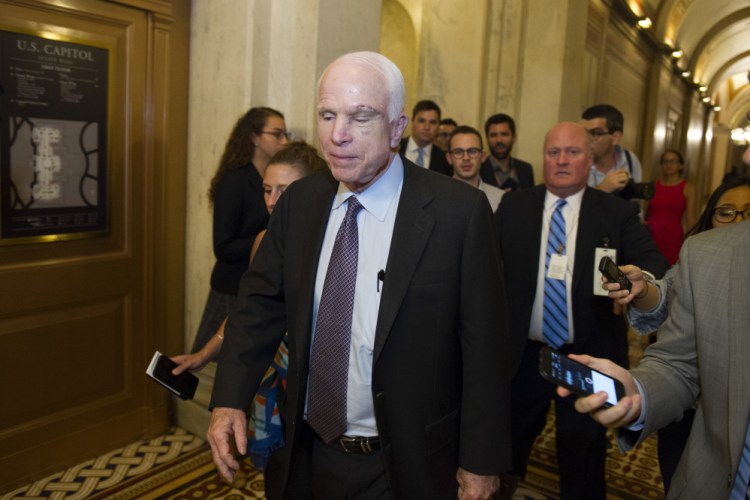Sen. John McCain is an American hero because of his valiant service to our country and courageous sacrifice as a prisoner of war, and apparently because he voted against a horrible bill that would have pushed millions of people out of the health insurance market, raised premiums, defunded Planned Parenthood, gutted Medicaid and put one-sixth of the U.S. economy into a tailspin.
McCain provided the crucial third “no” vote in the wee hours of Friday morning, protecting Americans from the last-ditch effort by the Republican Party to shoot and injure anything resembling Obamacare. Mitch McConnell’s last move to quell the torches-and-pitchforks crowd who put Republicans in power failed because demands that McCain and fellow Sens. Lindsey Graham and Ron Johnson made to Paul Ryan, speaker of the House of Representatives, were not met.
The Thursday afternoon demands of McCain and company were simplistic and in keeping with today’s politics – absolutely absurd, in other words. Picture three old guys on a stage, sweating under bright lights and cameras and trying mightily to do something – anything – to stop the debacle unfolding in their party.
“OK, boys, here’s what we’re gonna do,” McCain-the-maverick offered up in far too many more words, “I will vote for the skinny bill because I oppose it if you guys, who support it, don’t vote for it.”
McCain’s demands to Speaker Ryan and the House were perhaps an attempt at an offer they couldn’t refuse, but more likely they didn’t understand it.
After a long night of Vote-a-Rama drama, McCain voted against the “skinny repeal” bill, drafted in secret, which hadn’t been read by anybody or scored by the Congressional Budget Office. (Democrats submitted a best-estimate-of-the-skinny to the CBO for the hypothetical score of 15 million to 16 million more people uninsured and health insurance premiums up 20 percent.)
Susan Collins and Lisa Murkowski voted no, too, on the skinny repeal, but their demands were not as ridiculous as McCain’s; ergo, they don’t deserve much credit. They voted against the “skinny repeal” fantasy fix because the repeal of Obamacare, fat or skinny, without a replacement is ludicrous – bad policy, bad process and bad politics (and maybe because of the dumb name) – but Collins and Murkowski are not mavericks. They have a brand, moderate, and they have a size.
Skinny, female and from the Northeast, Collins was challenged by an obese congressman from Texas, Blake Farenthold, to a duel over her opposition to repealing or starving Obamacare.
Farenthold said to a radio host, “If it was a guy from South Texas, I might ask him to step outside and settle this Aaron Burr-style.”
Obesity is measured by a formula. People are considered obese if they have a body mass index of 30 or more, and extremely obese if their number is 40 or more, but you don’t need a calculator to determine whether Farenthold is obese. There’s no doubt he’s huge, as Sen. Collins said, and he’s unattractive, but accurately commenting on the size of someone who is not skinny is a faux pas, so Collins apologized. Farenthold apologized, too, which was big of him.
My observations about fat men in power pontificating about smaller government often get edited, but if my attempted use of adjectives like “corpulent,” “enormous,” “vast,” “immense,” “large,” “big,” “great,” “massive,” “colossal,” “gigantic” and “mammoth” to describe fat guys offends you, I apologize, too.
Skinny Murkowski didn’t apologize to Interior Secretary Ryan Zinke when he threatened the Alaskan senator with harsh economic repercussions for her vote against opening debate on skinny repeal. Zinke is a former Navy SEAL from Montana who arrived on the first day of his job in Washington riding a horse named Tonto. Zinke is not fat or skinny. He’s a maverick.
Zinke is rugged and Murkowski is the chairman of the Senate Energy and Natural Resources Committee, who responded to the secretary’s threats by indefinitely postponing a nomination that his Interior Department badly wants.
“I base my votes on what I believe is in Alaska’s best interest,” Murkowski told reporters with a smile.
It’s in Maine’s best interest that Obamacare is not repealed without a bipartisan replacement, and for her vote Friday morning, Sen. Collins need not apologize.
Cynthia Dill is a civil rights lawyer and a former state senator. She can be contacted at:
Twitter: @dillesquire
Send questions/comments to the editors.



Comments are no longer available on this story